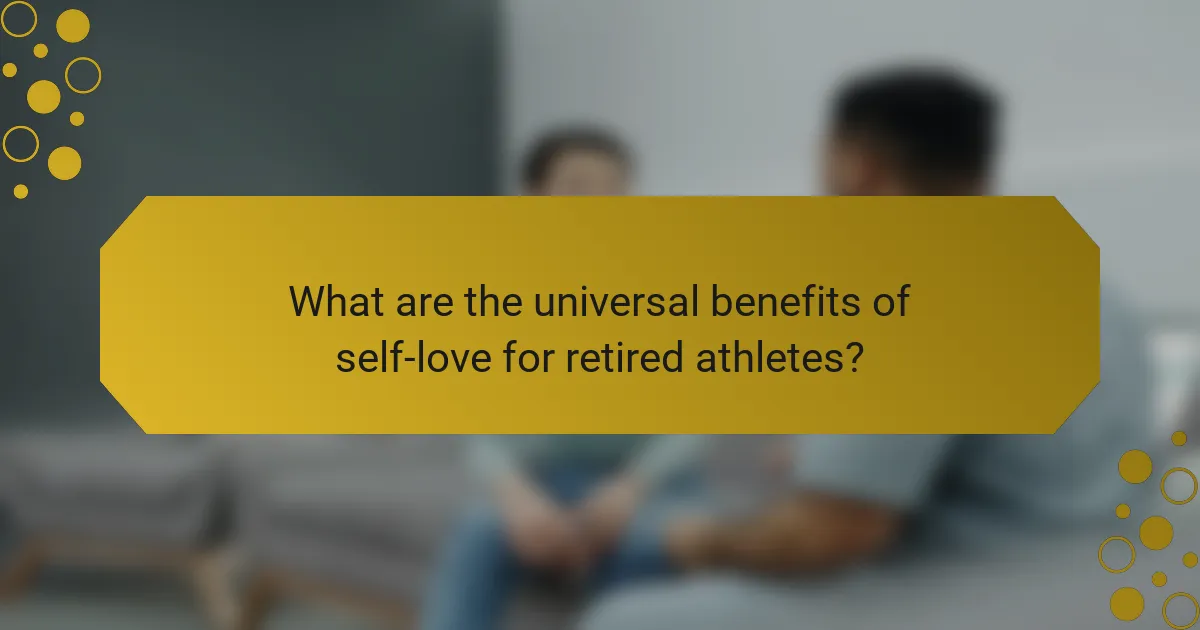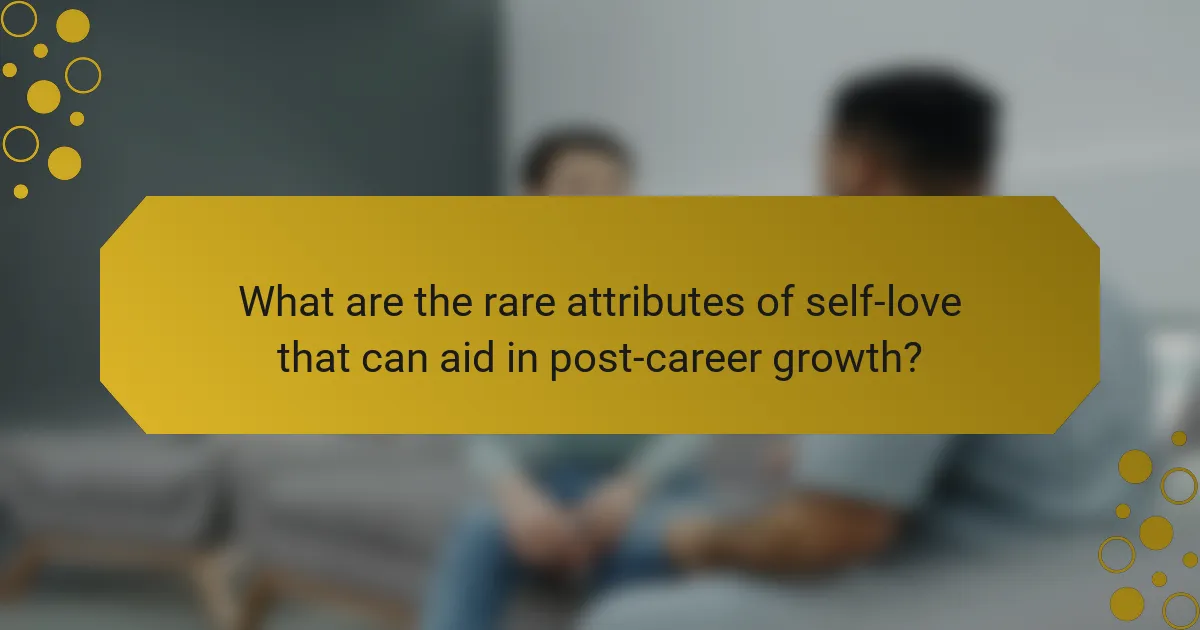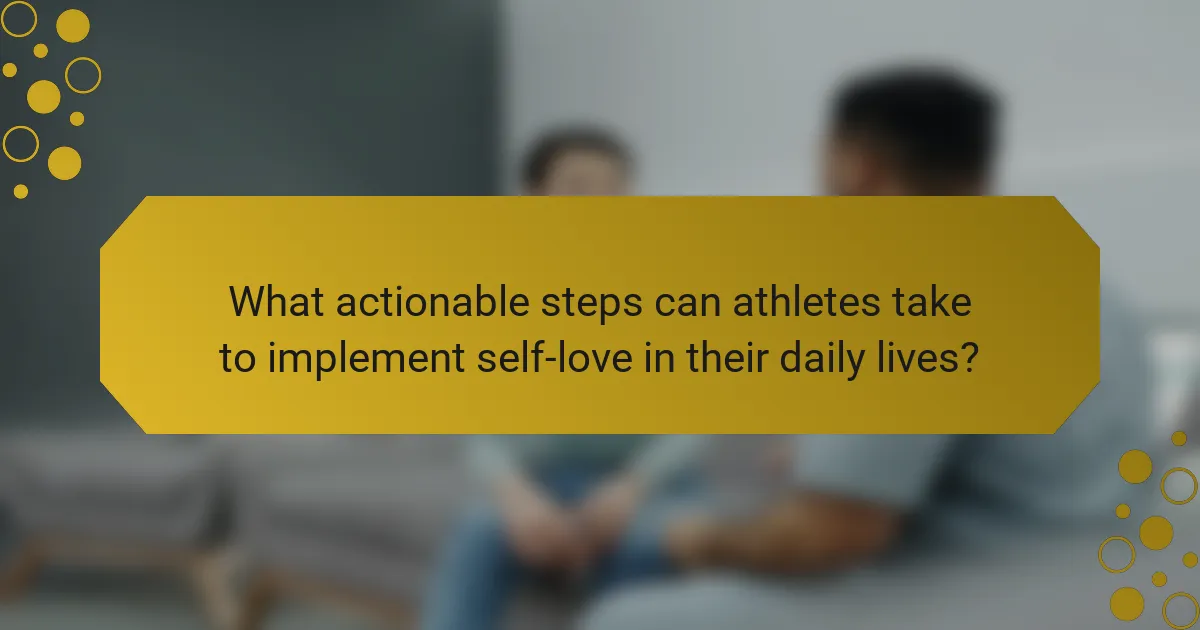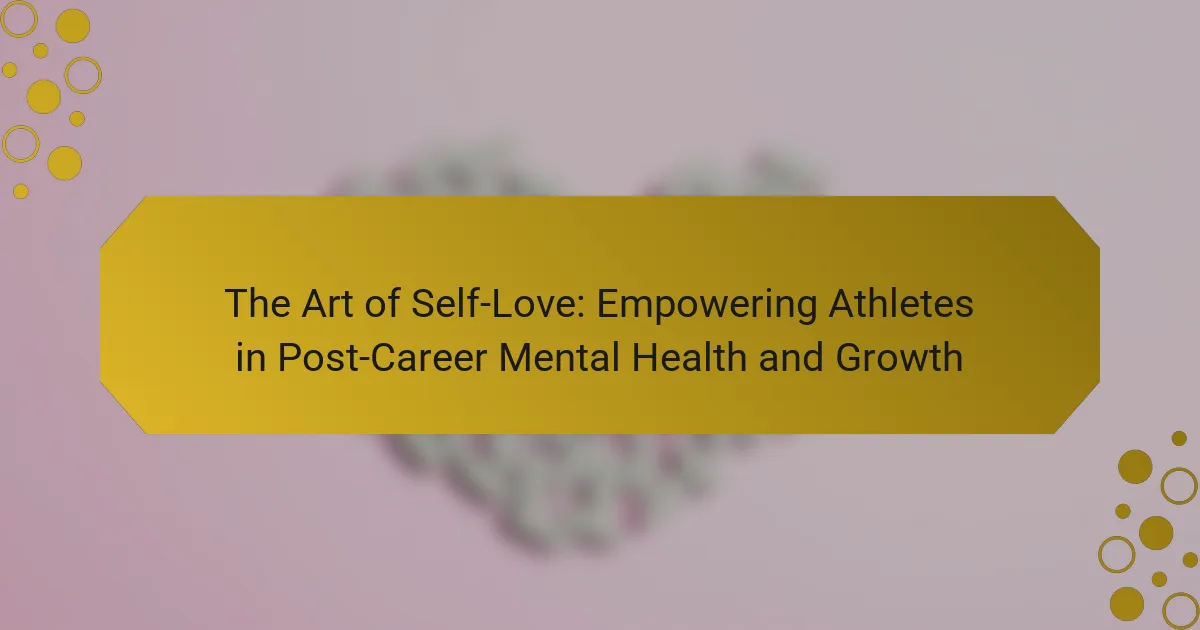Self-love is crucial for enhancing the mental well-being of retired athletes as they navigate post-career challenges. It fosters resilience and emotional stability, helping athletes redefine their identities beyond sports. Practicing self-love leads to lower anxiety and depression levels, promotes personal growth, and encourages healthier relationships. Strategies such as mindfulness, self-reflection, and building support networks are essential for successful transitions into new life phases.

How does self-love impact an athlete’s mental health after retirement?
Self-love significantly enhances an athlete’s mental health after retirement by fostering resilience and self-acceptance. Embracing self-love helps former athletes navigate identity shifts and emotional challenges. Studies show that athletes who practice self-love experience lower levels of anxiety and depression, promoting overall well-being. Cultivating self-love also encourages personal growth, allowing athletes to redefine their purpose beyond sports. This transformation can lead to improved mental health outcomes, supporting a smoother transition into post-career life.
What are the common mental health challenges faced by retired athletes?
Retired athletes commonly face mental health challenges such as depression, anxiety, identity loss, and loneliness. These issues often stem from the abrupt transition from competitive sports to everyday life.
Depression affects many retired athletes, with studies indicating a prevalence rate of around 30%. Anxiety is also significant, often linked to performance pressure experienced during their careers.
Identity loss is a unique attribute; many athletes struggle with their self-worth after leaving the sport. Loneliness can be a rare attribute, as the social connections formed during their athletic careers may diminish over time.
Addressing these challenges requires proactive mental health strategies and support systems to foster self-love and personal growth post-career.
What role does self-acceptance play in post-career adjustment?
Self-acceptance is crucial for athletes adjusting post-career, fostering mental health and personal growth. It allows individuals to embrace their identity beyond sports, reducing anxiety and depression. Studies show that self-acceptance can enhance resilience, enabling athletes to navigate the transition effectively. This emotional stability promotes a positive outlook, encouraging new pursuits and relationships. Ultimately, self-acceptance empowers former athletes to redefine success and find fulfillment in life after sports.
What steps can athletes take to cultivate self-acceptance?
Athletes can cultivate self-acceptance by embracing their unique journeys and recognizing their inherent value. They should practice self-compassion, engage in positive self-talk, and set realistic goals. Regular mindfulness exercises can enhance self-awareness and reduce negative self-judgment. Additionally, seeking support from mental health professionals fosters a healthier mindset and reinforces the importance of emotional well-being.
How can athletes redefine their identity beyond sports?
Athletes can redefine their identity beyond sports by embracing personal growth and exploring new passions. Engaging in self-reflection allows athletes to assess their values and interests outside of their athletic careers. Pursuing education and new skills fosters a sense of purpose, contributing to mental well-being. Building supportive networks with peers in similar transitions can enhance emotional resilience. Creating a new narrative that includes diverse experiences promotes holistic self-identity, leading to a fulfilling post-career life.

What are the universal benefits of self-love for retired athletes?
Self-love significantly enhances the mental well-being and personal growth of retired athletes. It fosters resilience, promotes emotional stability, and encourages a positive self-image.
By prioritising self-love, retired athletes experience improved mental health, which is crucial during the transition from competitive sports. This practice helps them redefine their identity beyond athletics, creating a sense of purpose and fulfilment in new endeavours.
Additionally, self-love cultivates healthier relationships, as athletes learn to value themselves, leading to stronger connections with family and friends. It also encourages mindfulness, allowing for better emotional regulation and stress management.
Ultimately, embracing self-love equips retired athletes with the tools to navigate their post-career lives successfully, enhancing overall life satisfaction and well-being.
How does improved self-esteem contribute to mental well-being?
Improved self-esteem significantly enhances mental well-being by fostering resilience and promoting positive self-perception. Higher self-esteem leads to increased motivation, better stress management, and improved relationships. Athletes transitioning from their careers may find that self-love cultivates a healthier identity, reducing feelings of loss and anxiety. Studies show that individuals with higher self-esteem report lower levels of depression and anxiety, contributing to overall mental health stability.
What are the long-term effects of self-love on emotional resilience?
Long-term self-love significantly enhances emotional resilience, fostering adaptability and coping mechanisms. Athletes who practice self-love experience improved mental health, allowing them to better navigate post-career challenges. Research indicates that self-compassion reduces anxiety and depression, promoting a positive self-image. This emotional strength enables individuals to rebound from setbacks, reinforcing their overall well-being and growth.

What unique strategies can athletes employ for self-love?
Athletes can employ unique strategies for self-love by prioritising mental well-being, practising gratitude, and engaging in self-reflection. These approaches foster a positive self-image and resilience.
One effective strategy is mindfulness meditation, which enhances self-awareness and reduces negative self-talk. Incorporating regular physical activity, even after retirement, promotes emotional balance and a sense of accomplishment.
Building a support network of fellow athletes or mental health professionals encourages open discussions about feelings and experiences. This connection can alleviate feelings of isolation and promote shared growth.
Lastly, setting personal goals unrelated to sports can help redefine identity and self-worth, encouraging athletes to explore new passions and interests beyond their athletic careers.
How can visualization techniques enhance self-love?
Visualization techniques can significantly enhance self-love by promoting positive self-reflection and emotional resilience. These techniques allow athletes to envision their strengths, achievements, and personal growth, fostering a deeper sense of self-acceptance. Research shows that visualization can improve mental well-being, encouraging a positive mindset and reducing negative self-talk. By regularly practising visualization, athletes can cultivate a more compassionate relationship with themselves, which is essential for mental health in post-career transitions.
What are effective visualization exercises for athletes?
Visualization exercises for athletes include techniques like guided imagery, mental rehearsal, and positive affirmation. These exercises enhance focus, reduce anxiety, and improve performance. For example, mental rehearsal allows athletes to visualize successful execution of skills, fostering confidence. Guided imagery creates a mental environment that simulates competition, enhancing emotional resilience. Positive affirmations reinforce self-belief, crucial for post-career mental health. Regular practice of these visualization techniques can lead to significant improvements in both athletic performance and overall well-being.
What role does community support play in fostering self-love?
Community support is crucial in fostering self-love among athletes transitioning from their careers. It provides a sense of belonging and validation, which enhances self-worth. Supportive networks enable sharing experiences and coping strategies, reinforcing positive self-perception. Engaging with peers promotes emotional resilience, essential for mental health growth post-career. This unique attribute of community support is vital for overcoming challenges and rediscovering identity, ultimately empowering athletes on their journey to self-love.

What are the rare attributes of self-love that can aid in post-career growth?
Self-love fosters resilience, adaptability, and self-awareness in athletes during post-career growth. Rare attributes include the ability to cultivate intrinsic motivation, develop emotional intelligence, and embrace vulnerability. These qualities enhance personal growth and mental well-being, supporting a smoother transition into life after sports.
How can athletes leverage creativity for self-exploration?
Athletes can leverage creativity for self-exploration by engaging in artistic practices that promote mental well-being. Creative outlets, such as painting, writing, or music, allow athletes to express emotions and experiences beyond the confines of sport. This process fosters self-awareness, helping them understand their identity beyond athletic performance. Engaging in creativity can also serve as a coping mechanism during transitions, enabling athletes to navigate post-career challenges effectively. By exploring their creativity, athletes can cultivate a deeper sense of self-love and resilience, essential for mental health and personal growth.
What creative outlets are beneficial for mental health?
Creative outlets such as painting, writing, and music can significantly enhance mental health for athletes post-career. Engaging in these activities fosters self-expression and emotional release. Studies indicate that creative practices can reduce anxiety and depression, promoting overall well-being. For instance, art therapy has shown a unique attribute of improving mood and self-esteem in individuals facing life transitions. Additionally, regular participation in creative activities can serve as a valuable coping mechanism, aiding athletes in their journey of self-love and personal growth.
What uncommon practices can enhance self-love among athletes?
Uncommon practices that enhance self-love among athletes include mindfulness meditation, creative expression through art, and engaging in nature therapy. These methods promote emotional well-being and self-acceptance. Mindfulness meditation helps athletes focus on the present, reducing anxiety and fostering self-compassion. Creative expression allows athletes to explore their identities beyond sports, enhancing self-worth. Nature therapy connects athletes to the environment, promoting relaxation and a sense of belonging. Each practice uniquely supports mental health, enabling athletes to embrace their post-career transitions with confidence.

What actionable steps can athletes take to implement self-love in their daily lives?
Athletes can implement self-love by adopting daily practices that foster mental well-being and personal growth. First, they should establish a consistent self-reflection routine, dedicating time each day to assess their thoughts and feelings. This helps in recognising their achievements and setting realistic goals.
Next, athletes can practice positive affirmations, which reinforce self-worth and combat negative self-talk. Engaging in mindfulness or meditation can further enhance emotional resilience, allowing athletes to remain grounded during challenges.
Additionally, maintaining a balanced lifestyle through proper nutrition, exercise, and adequate rest is crucial. These elements contribute to overall well-being and support a positive self-image.
Lastly, seeking support from peers or professionals can provide valuable perspectives and encouragement. Building a strong support system reinforces the importance of self-love in their lives.
What are the best practices for maintaining mental health post-retirement?
To maintain mental health post-retirement, athletes should prioritise self-love and personal growth. Engaging in regular physical activity, establishing new routines, and seeking social connections are essential practices. Additionally, mindfulness techniques and professional support can enhance emotional well-being. Fostering a sense of purpose through hobbies or volunteering also contributes positively to mental health.
What common mistakes should athletes avoid in their self-love journey?
Athletes should avoid neglecting self-care, comparing themselves to others, and dismissing their emotions. These mistakes hinder personal growth and mental health. Focusing on individual progress and embracing vulnerability fosters a healthier self-love journey. Acknowledging achievements, no matter how small, enhances self-worth and resilience.
How can athletes create a sustainable self-care routine?
Athletes can create a sustainable self-care routine by prioritising mental health, physical well-being, and emotional balance. Incorporating practices such as mindfulness, regular exercise, and adequate rest fosters resilience. Setting realistic goals and seeking support from professionals enhances growth post-career. Building a network of peers provides accountability and shared experiences, reinforcing commitment to self-care.
